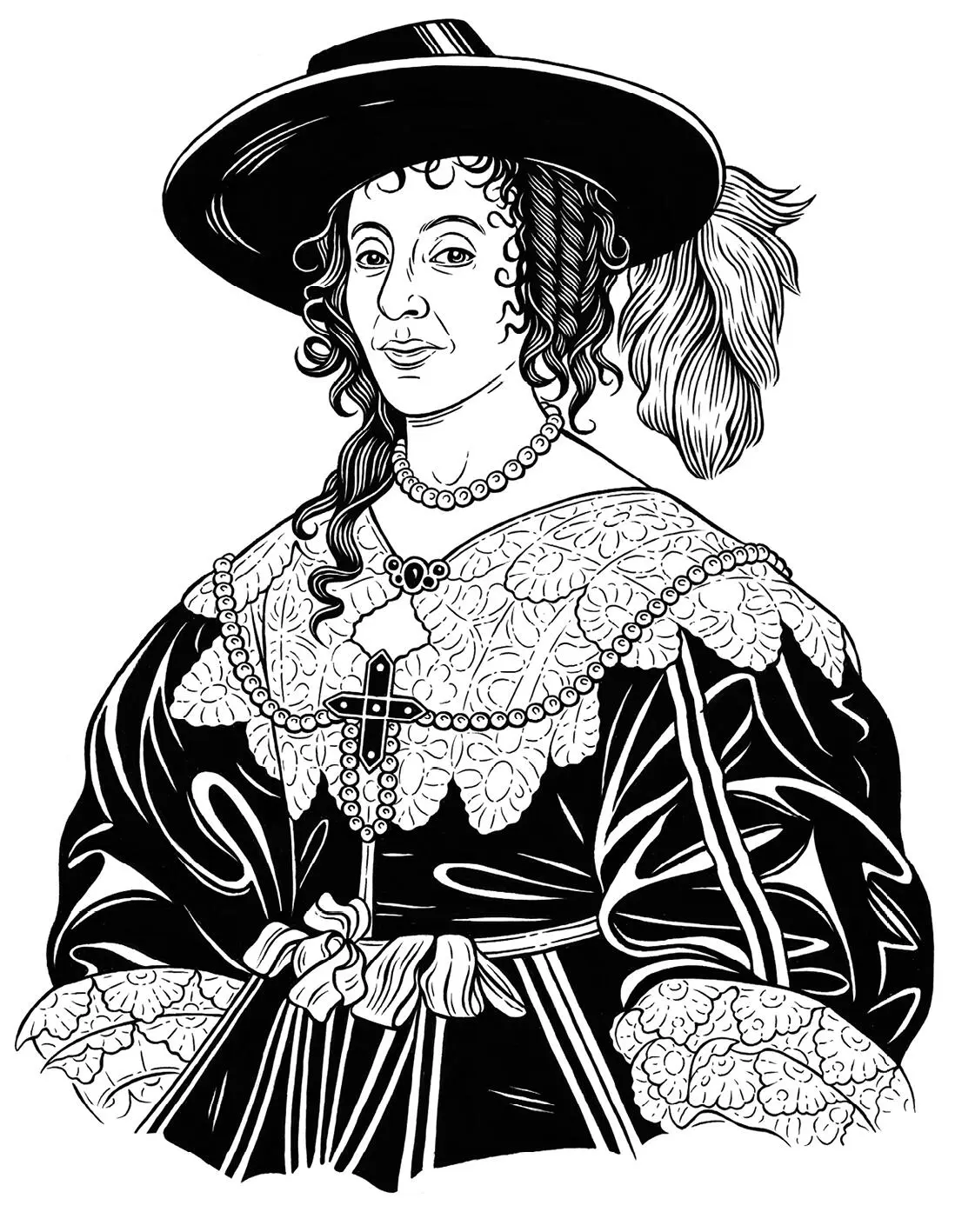Queen Tamar and her court also gave inspiration to Georgia’s national poet of the time, Shota Rustaveli. He was a court official and seemingly greatly enamoured with the Queen, writing, ‘God who is six days brought forth out of nothingness all that is, rested the seventh day in the sweet and gentle spirit of Tamara.’ Rustaveli’s great epic poem The Knight in the Panther’s Skin is also dedicated to Tamar, ‘the jet-haired and ruby-cheeked’, and it is believed the description of the Princess Tinatin is a tribute to the Queen: ‘Tinatin is radiant as the rising sun, born to illuminate the world around her, so fair that the very sight of her would make a man lose his wits.’
Queen Tamar died in around 1213, having ruled Georgia as sole monarch for more than a quarter of a century, the first woman to have done so. Georgia had reached the zenith of its power and influence under her rule, although within just a few decades much of her work would be undone, as Mongol forces would overrun much of the kingdom. Whilst we may not know definitively where Queen Tamar is buried, it is perhaps of little importance as her name, certainly in Georgia, lives on. Her achievements, however, deserve greater credit elsewhere in the world. As the Georgian writer Grigol Robakidze put it in an essay from 1918: ‘Thus far, nobody knows where Tamar’s grave is. She belongs to everyone and to no one: her grave is in the heart of the Georgian.’


Henrietta Maria of France

Born: 1609
Died: 1669
In February 1643, Henrietta Maria, queen consort to the doomed English King Charles I, sailed through a stormy North Sea from the Netherlands to England. Bad weather forced her to disembark at Burlington Bay in Yorkshire, where she sought sanctuary in a nearby coastal cottage. At 5 a.m., a fleet of parliament warships, which had been in pursuit of her, fired cannon directly at the cottage, forcing her to flee with her ladies and her dog, Mitte, to the shelter of a ditch. There they lay in the freezing cold and, as she wrote in her own account, ‘the balls passing over our heads and sometimes covering us with dust’ whilst ‘a serjeant was killed twenty paces from me’.
It’s a story of high drama, but surprisingly little known, and is certainly far less famous than one featuring her son, the future King Charles II, who in a similar escape from enemy forces hid in an oak tree in 1651. And yet the only danger that befell him was not that he was bombarded by cannon but rather that an enemy soldier passed by underneath … He, however, was a man and a future king, and Henrietta Maria simply a queen, and a deeply unpopular one at that, who, depending on who you believe, did little of real importance or was entirely to blame for the downfall of the monarchy.
The reason for her unpopularity? Well, it’s the usual story that not only was she a woman, but also Catholic and French to boot – and indeed the first French princess to marry an English king since Margaret of Anjou – and the English have never exactly warmed to queens of their longstanding enemy. She and the King were also firm believers in the divine right to rule (and thus answerable only to God), which led to an inevitable clash with Parliament, the execution of Charles and the end of the monarchy in England from 1649 to 1660. This intransigence would ultimately contribute to their downfall but Henrietta Maria was, if nothing else, loyal to the King, working tirelessly on his behalf, both in the political arena and on the battlefield.
Henrietta arrived in Protestant England in 1625, a fifteen-year-old French princess who was the youngest daughter of King Henry IV of France and Marie de Medici. Henrietta and King Charles I married in Canterbury, but not long after there were apparent tensions in the marriage, largely caused by Charles’s mentor the Duke of Buckingham, who was determined to cause trouble between the couple. According to the diarist John Evelyn, Henrietta’s all-Catholic entourage were so disparaging about the Protestant religion that by 1646 Charles had sent many of them back to France, to which she reacted with typical teenage histrionics, writing: ‘I am the most afflicted person on earth.’ Her relationship with Charles, however, improved, even more so when Buckingham was assassinated in 1628.
Thereafter, her marriage with the King blossomed into one of real devotion and love – they wrote regularly, Charles addressing many of them ‘Dear Heart’ – and by 1630, Henrietta had given birth to the future Charles II. Over the next decade she would give birth to another six children who would live beyond early childhood. Henrietta Maria was still a devout Catholic and the closeness of the royal couple would lead to suspicions about her influence over the King. When in 1637 Charles attempted to introduce a new prayer book to Presbyterian Scotland, which triggered rebellion, people feared that this was the first step towards reinstating Catholicism, with many pointing the finger of blame at the Queen, the ‘popish brat of France’. Needing funds to fight the war in Scotland, Charles summoned Parliament, who refused to issue him with a tax subsidy. The King subsequently dissolved Parliament and by August 1642, civil war had broken out between Charles and his Royalist supporters and Parliament.
Henrietta, meanwhile, had been trying to enlist the support for the King from the Pope, the French and the Dutch, and when the civil war broke out she was in the Netherlands raising funds for the King (having also smuggled out many of the Crown Jewels and her personal valuables). Her return from the Netherlands led to the aforementioned forced landing at Burlington Bay, where pursuing parliamentary ships were intent on capturing or killing her. She was saved by a Dutch escort who threatened to open fire on the ships, forcing them to retreat. Despite the narrow escape, she remained undaunted and spent months in the north of England recruiting men and raising funds, continually arguing for nothing less than a total victory over Charles’s enemies. Having evaded capture again during a bloody battle against the parliamentary cavalry, the ‘generalissima’, as she jokingly called herself, arrived at Oxford with an army and ammunition and enjoyed an emotional reunion with her husband.
Henrietta continued to be accused by Parliament and London society of a papist conspiracy, not helped by a massacre of Protestant settlers during a rebellion in Ireland in 1641, which some believed was organised by Jesuits linked to the Queen. Suspicions about her turned to hatred and by 1644, Parliament was quick to make the most of her poor image, publishing a pamphlet entitled ‘Great Eclipse of the Sun’ that claimed ‘… the King was eclipsed by the Queen, and she perswaded him that the Darknesse was Light and that it was better to be a Papist, than a Protestant …’ and called for her impeachment as a traitor.
On the battlefield, things turned from bad to worse for the King and Royalist forces. Knowing that she would likely be executed if captured, Henrietta was forced to flee to France. Before she left, Henrietta and Charles said their final farewells in April 1644, not knowing that this would be the last time they would ever see each other. Henrietta was heavily pregnant and bore her final child, Henrietta Anne, in Exeter in June. Desperately ill from the birth, she nonetheless left ten days afterwards, leaving the baby in Exeter due to the risks of the journey. She fled disguised in humble dress and was forced to hide in a hut for two days, where, as she wrote, she could hear parliamentary soldiers passing by talking about the 50,0000-crown reward for the return of her head to London. She eventually boarded a Dutch ship for France, and despite coming under fire once again from parliamentary ships, she made it to the sanctuary of her family.
Читать дальше









![Джеффри Арчер - The Short, the Long and the Tall [С иллюстрациями]](/books/388600/dzheffri-archer-the-short-the-long-and-the-tall-s-thumb.webp)





